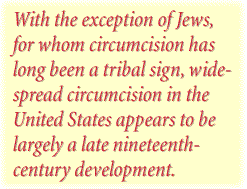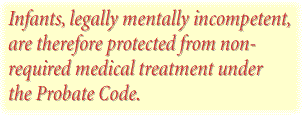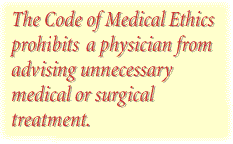. July/August 1989.
. July/August 1989.
Circumcision has origins dating back 4,000-5,000 years, to a time before Abraham and his covenant with God to circumcise his people. Through the ages, civilization has witnessed numerous forms of child abuse enjoying significant popularity, including sterilizations, female circumcision, infanticide, ritual sacrifice, binding of the feet, and ritual piercing and mutilations. While almost 80% of the world's populations have ceased or avoided the ritual of circumcision, nearly 60% of American infant males and the majority of Moslems and Jews still suffer this mutilation.

With the exception of Jews, for whom circumcision has long been a tribal sign, widespread circumcision in the United States appears to be largely a late nineteenth-century development.
Anthropologists, psychologists, and psychiatrists have offered a variety of explanations for the practice: enhanced sexual performance, decreased sexual pleasure to prevent moral degeneration, social prestige, sacrifice to fertility gods, tribal signs, tests for endurance, reincarnation, and hygienic reasons. However, with the exception of Jews, for whom circumcision has long been a tribal sign, widespread circumcision in the United States appears to be largely a late nineteenth century development. For non-Jews, it serves neither as a means of tribal integration, or separation and identification, nor as an initiation rite to establish male identity. The customary justification for male genital mutilation is hygienic but it seems to have been primarily grounded is anti-masturbation hysteria of the late 1800s and flourished following mass military circumcisions during WWII. (23 FAML 337).
Circumcision, as an unnecessary medical treatment, raises four major legal issues, beyond the traditional malpractice cause of action for a negligent procedure.
Decisions regarding child rearing, care and education have been recognized as being entitled to protection as a fundamental right of personal liberty under the Constitution. [Walen v. Roe (1977) 429 U.S. 589, 599-600; Peoples v. Privitera (1979) 23 Cal 3rd 697, 702; In re Roger S. (1977) 19 Cal 3rd 921, 928.] However, this parental duty and right is subject to limitations if it appears that parental decisions will jeopardize the health or safety of the child, or have a potential for significant social burdens.
[Wisconsin v. Yoder (1972) 406 U. S. 205, 234; People v. Privitera, supra, 703; In re Roger S., supra, 928.] If these conditions are present the state may assert important interests in safeguarding health and safety and in maintaining medical standards. [Roe v. Wade (1973) 410 U.S. 113, 153-154; People v. Privitera, supra, 703.] In Privitera, the Supreme Court recently held that when important interests of health and safety are involved the State's regulations shall be tested under the rational basis test. [People v. Privitera, supra, 702, fn. 2, 703.]
A parents' right to consent to medical treatment is not statutory in California, but rather derives from the common law. It Kate's School v. Department of Health (1979) 155 Cal. Rptr. 529, - a case regarding a parents right to prescribe their treatment of choice for their mentally disordered children, the court held that the regulation of intrusive and possibly hazardous forms of treatment of mentally disordered children, such as involved in behavior modification therapy through corporal punishment, is a proper exercise of the state's police power and bears a rational relation to the state's interest in the protection of the health and safety of the children...
This decision establishes that parents' rights to consent to treatment are not unlimited. Surgical removal of an infant's foreskin, without medical justification, presents a more serious threat to the health and safety of the child than corporal punishment, thereby justifying exercise of the state's police power.

Infants, legally mentally incompetent, are therefore protected from non-required medical treatment under the Probate Code.
In an unpublished 1987 decision of the Court of Appeal, 1st District No. A03040, London v. Glassner et al., petition for review denied, parental consent to
(emphasis added.) This court then held any ... medical treatment
is found to be without apparent limitation, regardless of purpose. Civil Code 25.8 cited as authority for this decision provides: Either parent if both parents have legal custody, or the parent or person having legal custody or the legal guardian of a minor may authorize in writing any adult person into whose care the minor has been entrusted to consent to ANY X-ray examination, anesthetic, MEDICAL OR SURGICAL diagnosis or TREATMENT and hospital care to be rendered to the minor under the general or special supervision and UPON THE ADVICE OF A PHYSICIAN AND SURGEON licensed under the provisions of the Medical Practice Act or to consent to an X-ray examination, anesthetic, dental, or surgical diagnosis or treatment and hospital care to be rendered to the minor by a dentist licensed under the provision s of the Dental Practice Act or to consent to an X-ray examination, anesthetic, dental or surgical diagnosis or treatment and hospital care to be rendered to the minor by a dentist licensed under the provisions of the Dental Practice Act.
While this section does not specifically grant any direct authority for parental consent, the trial court found the legislative history was to extend the common law authority of parents.(a) circumcision is a medical, surgical treatment,
rejecting plaintiff's public policy argument that children should be protected from suffering unjustifiable pain or risk - based on the premise that parents cannot consent to surgical procedures which have no medical purpose.

The State's interest in an infant's First Amendment constitutional rights of Safety, Liberty, Privacy, and Happiness exceed the State's interest in protecting parents' constitutional rights.
The London decision is unsupported and contradicted by the California Supreme Court's decision in Conservatorship of Valerie N. v. Valerie N. (1985) 219 Cal. Rptr. 387). The case deals with the rights of parents of a mentally incompetent adult to consent to sterilization, a recognized medical treatment. The court found that the parents as conservators were not entitled to have conservatee, who was unable to consent to sterilization, sterilized inasmuch as there was neither evidence of necessity ... nor sufficient evidence that less intrusive means ... were not presently available to conservatee.
This court further holds ... as to those medical procedures permitted after court authorization the Legislature has required a judicial determination that the condition of the conservatee
as provided in Cal. Probate Code Section 2357. subh. (h)(1). Infants, legally mentally incompetent, are therefore protected from nonrequired medical treatments under the Probate Code.require the recommended course of medical treatment
The State's interest in circumcision, beyond financial considerations of Medi-Cal coverage and the maintenance of ethical medical standards and procedures, involve the protection of an infants rights to Liberty, Privacy, Safety, and Happiness under the California Constitution Article I, the Federal protection against arbitrary deprivation of Due Process and Equal Protection under the Fourteenth Amendment, and the violation of criminal statutes against child and sexual abuse.
The State's interest in an infant's First Amendment constitutional rights to Safety, Liberty, Privacy, and Happiness exceed the State's interest in protecting parent's constitutional rights.
Parental rights to the custody and control of their minor children are as old as civilization itself. Modern judges refer to parents' custodial rights as
23 JFAML 337. The generalized claims of parental constitutional rights have not been without challenge; courts at all levels of the judicial hierarchy have occasionally intruded into the family relationship to protect children. Ibid. The most important Supreme Court cases reflecting state and judicial intervention are Prince v. Massachusetts, 321 U.S. 158 (1944), and the cases involving the rights of teenage females to have abortions, Bellotti v. Baird 443 U.S. 622 (1979); Cary v. Population Service International, 431 U.S. 678 (1977). Ibid. The essence of the Prince decision is captured in the statement that sacred,
as a matter of natural law
and as inherent natural rights,
for the protection of the rights of the individual to life, liberty, and the pursuit of happiness, our government is formed.parents may be free to become martyrs themselves. But it does not follow they are free ... to make martyrs of their children before they have reached the age of full and legal discretion when they can make that choice for themselves.
Prince, supra, 170. Under Yoder, supra 234, parental authority and discretion may be challenged if it appears that parental decisions will jeopardize the health and safety of the child...
This demonstrates that the child's right to safety overcomes parental constitutional rights.

The preservation of one's bodily reproductive functions is a fundamental right, and the termination thereof constitutes a serious invasion of the sanctity of the person.
In California, Valerie N., supra, the court held that The courts have ... recognized individual Liberty in things of the body as a touchstone,
(Note, Due Process, Privacy and the path of progress (1979) U. Ill. L. Forum 469, 504-505, 515; see Union Pacific R. Co. v. Botsford (1981) 141 U. S. 250, 251-252 (common law right of personal injury plaintiff to be free of compulsory physical examination), cited in Roe v. Wade (1973) 410 U.S. 113,152; Schmerber v. California (1966) 384 U.S. 757, 778-779 (dis. opn. of Douglas); Breithaupt v. Abram (1957) 352 U.S. 432, 441-442 (dis. opn of Warren, C. J.); Id., at 443-443 (dis. opn. of Douglas, J.). The preservation of one's bodily reproductive functions is a fundamental right, and the termination thereof constitutes a serious invasion of the sanctity of the person.
Guardianship of Tully (1978) 83 Cal. App. 3d 698, 705. Liberty means more than freedom from servitude, and the constitutional guarantee is an assurance that the citizen shall be protected in the right to use his powers of mind and body in any lawful calling.
Smith v. Texas (1914) 233 U. S. 630, 636. Although the Court has not assumed to define
(Bolling v. Sharpe (1954) 347 U.S. 497, 499-500. There is no proper government objective which justifies restricting the infant's right to keep his bodily parts intact and enjoy a full use of his sexual organs.liberty
with any great precision, that term is not confined to mere freedom from bodily restraint. Liberty under the law extends to the full range of conduct which the individual is free to pursue, and it cannot be restricted except for a proper governmental objective.

There is no proper government objective which justifies restricting the infant's right to keep his bodily parts intact and enjoy a full range of use of his sexual organs.
In the California discussion of sterilization of mental incompetents, Valerie N., supra, it cites with approval In Matter of Guardianship of Hayes 93 Wash. 2d 228 where the Washington court concluded: In the rare case sterilization may indeed be in the best interest of the retarded person ... However, the court must exercise care to protect the individual's right to PRIVACY, and not unnecessarily invade that right. Substantial medical evidence must be adduced, and the burden on the proponent ... will be shown by clear, cogent and convincing evidence that such a procedure is in the best interest of the retarded person.
Valerie N., supra, goes on to find that it is necessary to preserve the right ... to be free of intrusive medical and surgical procedures...
The State's interest in protecting an infant's rights to due process and equal protection is derived from the incompetency of his age and the accident of birth, his sex. To deprive a baby boy of his constitutional rights of Liberty, Safety, Privacy and Happiness must serve a compelling state interest.
While ensuring the constitutional rights of parents in care and child rearing is an important state interest, that interest is subordinated to the child's when the parental discretion may jeopardize the health or safety of that child. A reasonable method to protect the child's due process rights, would be to provide for a judicial hearing, with the child represented by a disinterested guardian ad litem, to insure the necessity of a medical procedure risking the health and safety of the incompetent minor. See Hayes, supra. In order to justify routine circumcisions for male infants which are not required or allowed for female infants, requires a compelling state interest
to meet established equal protection analysis requirements. No state interest of any kind is served by the policy of sexually discriminatory routine circumcisions, and it therefore violates both the State and Federal Equal Protection clauses of the Fourteenth Amendment.
Hayes, supra cited with approval in Valerie V., supra, provides a reasonable framework establishing a standard for third party consent to intrusive medical and surgical procedures. While Hayes and Valerie concern cases of sterilization is medically indicated as the last and best resort for the individual. Can it be shown by clear, cogent and convincing evidence, for example that other methods of birth control are inapplicable or unworkable?
... The decision can only be made in a superior court proceeding in which (1) the incompetent individual is represented by a disinterested guardian ad litem, (2) the court has received independent advice based upon a comprehensive medical, psychological, and social evaluation of the individual, and (3) to the greatest extent possible, the court has elicited and taken into account the view of the incompetent individual.
Within this framework, the judge must first find by clear, cogent and convincing evidence that the individual is (1) incapable of making his or her own decision..., and (2) unlikely to develop sufficiently to make an informed judgment ... in the foreseeable future.
Next, it must be proved by clear, cogent and convincing evidence that there is a need...
Finally, there must be no alternative... The judge must find clear, cogent and convincing evidence (1) all less drastic ... methods, ... have been proved unworkable or inapplicable, and (2) the proposed method ... entails the least invasion of the body of the individual.
Valerie N., supra, 466-467.

This justification for granting third party consent for circumcision cannot survive review.
Neonatal circumcision shares sufficient characteristics with sterilization of mental incompetents to justify utilizing the same standards to approve third party consent. Both practices remove a natural, healthy part of the anatomy without therapeutic necessity, in an irreversible procedure. Both restrict the full and complete enjoyment of the reproductive organs. Both have a tradition of government supported abuse. Both force the acceptance of an involuntary risk of surgical complications and death. Both restrict the patient's individual constitutional rights to Privacy, Liberty, Safety, Happiness, Due Process, and Equal Protection.
The primary difference between third party consent in the cases of neonatal circumcision and involuntary sterilizations of incompetents is that infants will one day be competent to make their own choices.

An operation or medical procedure without valid consent constitutes battery and false imprisonment.
The court in Valerie, supra, 448, justifies the necessity of granting a third party consent for mental incompetents to protect their constitutional right to procreative choice. We do not pretend that the choice of the (incompetent's) parents, her guardian ad litem, or a court is her own choice. But it is ... one designed to further the same interests she might pursue had she the ability to decide for herself.
In re Grady, supra, 426 A.2d at 481. This justification for granting third party consent for circumcision can not survive review.
Critical to the issue of civil liability, absent medical negligence, is the lack of actual or informed consent.
The well recognized legal incompetence of an infant precludes direct or personal consent. An operation or medical procedure without valid consent constitutes battery and false imprisonment. (See Rainer v. Community Memorial Hospital (1971) 18 Cal. App. 3d 240, 255; City of Newport Beach v. Sasse (1970) 9 Cal. App. 3d 803, 810.) Third party consent to a surgical procedure can be granted with validity, conditional upon the circumstances, by a parent, guardian ad litem, or the courts. (See Valerie N., 219 Cal. Rptr. 3877) The substituted consent doctrine is often invoked to permit consent by parents or guardians for surgery on an incompetent conservatee or minor. (See Probate Code 2353, 2355, 2357) However, even as to those intrusive medical procedures permitted after court authorization, the Legislature has required a judicial determination that the condition of the conservatee
(emphasis added) (Valerie N., Supra, 452.) Civil Code 25.8 which generally provides a right for parents to extend consent for any medical treatment rendered, UPON THE ADVICE OF A PHYSICIAN AND SURGEON must meet the same standard as specified under the Probate Code, that is the child REQUIRES THE RECOMMENDED COURSE OF MEDICAL TREATMENT.
requires the recommended course of medical treatment.

The Code of Medical Ethics prohibits a physician from advising unnecessary medical or surgical treatment.
The Code of Medical Ethics prohibits a physician from advising unnecessary medical or surgical treatment. The AAP has declared there is no absolute medical indication for routine circumcision.
Certainly, if there is a recognized medical indication for an individual neonatal circumcision, the attending physician would have no difficulty advising that the procedure is required. This medical determination and advice would allow the parents, guardians, or court to make a valid informed consent
on the part of the minor, for the surgical procedure of circumcision. Absent a recognized medical indication and physician advice, no third party would be in a position to make a valid informed consent.
Absent a valid informed consent
the physician and those assisting (parents, staff, hospital) in the non-consensual, intentional confinement and operation on a minor can be held liable for battery and false imprisonment.

The civil law presently offers more fruitful avenues of approach to prevent genital mutilations.
Suits for damages against surgeons, hospitals, and conceivably parents, are possible because malice in the sense of ill will or a desire to cause injury is not essential to sustain a recovery for intentional wrong doing. It is enough for the plaintiff to show that the defendant knowingly and intentionally did the act which caused the damage and that damage was substantially certain to follow. The limitation posed by suits for negligence in this area is grounded in societally determined assumptions and expectations which are slowly changing to recognize circumcision as mutilations. (See 23 JFAML 337)
Once it is shown that a child has been subject to an injury to his sexual organ, without valid informed consent
or medical necessity, a case may be made for enforcement of existing state laws prohibiting assault and battery, conspiracy to assault and batter, child abuse, and sexual abuse. However it will be extremely difficult to get a conviction, since circumcision is not culturally acknowledged as child abuse at the present time. Additionally, in some jurisdictions it may be difficult to establish the requisite criminal intent. For this reason, the civil law presently offers more fruitful avenues of approach to prevent genital mutilations.
Perhaps a promising approach would be a civil rights class action against hospitals designed to prevent routine neonatal circumcisions, that is, in cases where circumcision is not medically warranted. A class action suit would focus on the individuals most culpable since competent surgeons are aware that routine neonatal circumcision is not good medical practice. It would also avoid the constitutional issues of parental rights, as well as religious issues, since the Orthodox Jewish circumcision ceremony is not normally performed in medical centers by medical personnel. (23 JFAML 337)
Charles A Bonner, J.D., is in private practice in San Francisco, California, with a specialty in personal injury and medical malpractice.
Michael J. Kinane is a law student at the Hastings School of Law, San Francisco, California
Reprinted with permission, The Truth Seeker, originally published July/August 1989.
The Circumcision Information and Resource Pages are a not-for-profit educational resource and library. IntactiWiki hosts this website but is not responsible for the content of this site. CIRP makes documents available without charge, for informational purposes only. The contents of this site are not intended to replace the professional medical or legal advice of a licensed practitioner.
© CIRP.org 1996-2026 | Filetree | Please visit our sponsor and host:
IntactiWiki.